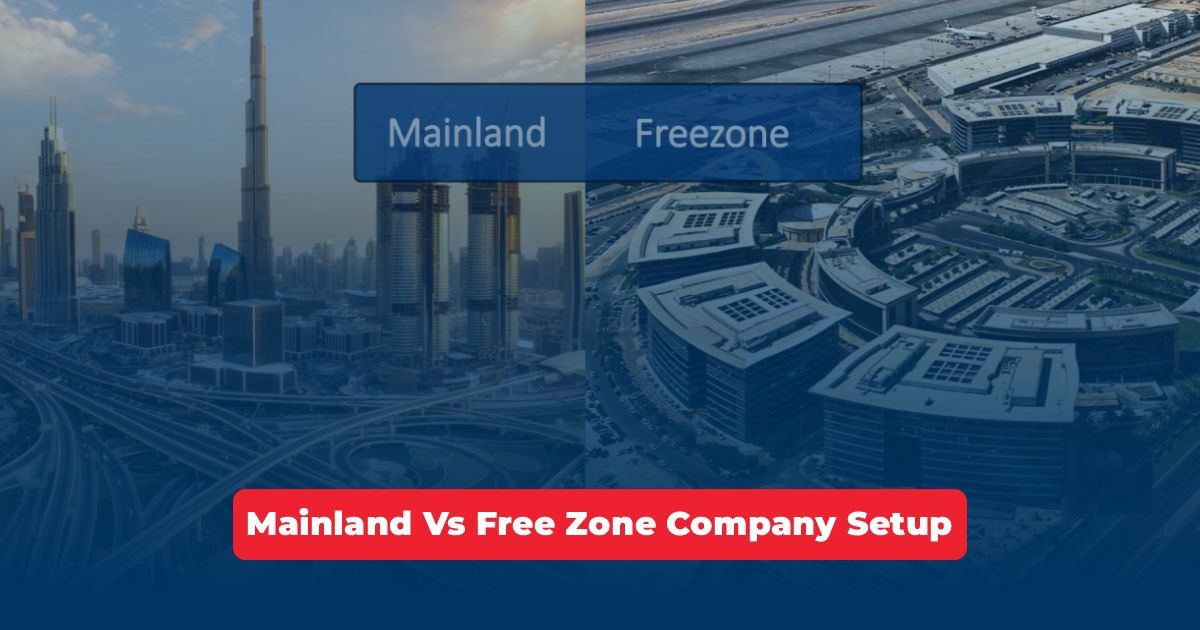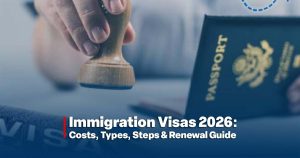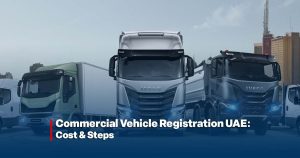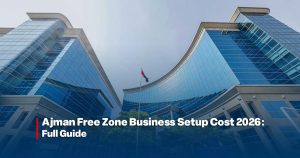Mainland vs Freezone—which setup really fits your business in the UAE? You’re not alone in asking. A 2024 report by the UAE Ministry of Economy shows over 60% of new businesses chose free zones for tax perks and ownership freedom (economy.ae). But is that the right choice for you? This guide breaks down the key differences and helps you pick what truly matches your goals, clearly, simply, and with expert help.
Table of Contents
ToggleWhat Is a Mainland Company in the UAE?
A mainland company is registered under the UAE government through the Department of Economic Development (DED). It can operate anywhere in the country, including local and international markets. You may get full foreign ownership depending on the business activity. Unlike free zone setups, mainland firms can trade directly with the government and private sectors across the UAE. You also gain access to government bids, more license options, and a wider customer base. Although the setup has more steps, the market reach is much greater. So, when comparing mainland vs. free zone, the mainland suits companies wanting full UAE market access.
What is a Free Zone Company?
A Free Zone Company in the UAE is a business formed inside a special area with its own rules. You get 100% ownership, no local partner, and tax-free benefits for up to 15 years. Setup is quick, rules are clear, and costs are lower. You can’t sell directly in the mainland, but you can trade globally. When comparing mainland vs freezone, choose based on your target market, business type, and long-term goals.
Mainland Vs Free Zone: What’s the Difference?
Before you set up a business in the UAE, it’s important to know the main differences between a mainland and a free zone company. Each setup has unique rules, costs, and benefits. Your choice will depend on your business activity, budget, and target market. Let’s break down the key points to help you choose wisely.
Main Differences Between Mainland and Free Zone Companies
-
Business Location
-
-
- Mainland companies have the right to do business anywhere in the UAE, covering all cities and local markets.
- In contrast, free zone businesses are restricted to their zone but are permitted to trade with markets outside the UAE.
- Free zones often focus on specific industries, while mainland firms enjoy full local mobility.
-
Ownership Rules
- Mainland: up to 100% foreign ownership in many sectors, but some still require a local agent.
- Free Zone: always 100% foreign ownership.
-
-
Market Access
-
-
- Mainland firms can sell directly in all UAE markets and take part in government projects.
- Free zone companies need a local agent to sell in the mainland market, but can trade worldwide.
-
-
Tax Policies
-
-
- Free zones usually offer zero corporate tax for a set period and no personal income tax.
- Mainland companies follow UAE tax laws, which now include corporate tax for some profits, but there’s no personal income tax in either case.
-
-
Set up Speed and Process
-
-
- Free zone setups are often quicker and use a single authority for approval.
- Mainland setups may need more approvals and take longer, but both now have online processes.
-
-
Office Requirements
-
-
- Mainland firms must lease a physical office.
- Free zones offer flexible options, including shared or virtual offices, which can lower startup costs.
-
-
Visa Eligibility
-
-
- Mainland: Visa allocation is based on the size of your office space. It also depends on your business activity.
- There are no strict limits on employee numbers. You are allowed to employ both UAE nationals and international workers.
- Free Zone: Visa quotas are usually pre-set. They depend on your chosen office package. More employees mean a larger office space is needed. However, hiring is typically simple
-
-
Government Contracts
-
-
- Mainland companies can bid on public tenders and work with government bodies.
- Free zone companies are prohibited from directly dealing with UAE government contracts.
- Profit Repatriation
- Both allow full profit and capital repatriation, with no currency limits.
- Free zones often make this process simpler.
-
-
Annual Audit
-
-
- Audits are required for both, but rules may vary by activity and location.
- Many free zones require yearly financial reports
-
-
Business Focus
-
-
- Mainland companies can cover all industries.
- Free zones specialize in industries such as media, logistics, and technology.
-
-
Legal and Regulatory Bodies
-
-
- Mainland companies are under UAE federal laws.
- Free zones are managed by their own authorities, each with unique rules..
-
-
Cost Range
-
-
- Free zones usually offer bundled packages at a lower cost.
- Mainland setups cost more due to office and possible local sponsor needs, but offer broader access.
-
-
Government Authority and Licensing.
-
- Mainland: You need to register with the Department of Economic Development (DED) in order to start a business on the mainland.
- The DED is your main licensing body and oversees your business activities.
- In addition, you may need to coordinate with local municipalities and other government departments, depending on your business type.
- Because several authorities are involved, the process can require more steps and paperwork.
- Free Zone: Every zone has its authority that manages all licensing and rules for businesses operating in free zones.
- You deal directly with this single authority, which manages everything from registration to daily compliance.
- The procedure is streamlined and expedited with this configuration.
- Many business owners find it easier to work with one main office, as it reduces delays and confusion.
-
Flexibility for Future Growth.
-
- Mainland: It’s easier to expand your business. You can open new branches across the UAE. You can also easily change your business activities. This offers greater long-term flexibility.
- Free Zone: Expanding outside your free zone can be challenging. It may require a mainland company setup. Additionally, shifting business operations can be more complicated.. Therefore, it’s often best for specialized businesses.
Mainland Vs Free Zone Company Setup
| Ownership | Up to 100% foreign in many sectors | 100% foreign ownership |
| Business Location | Anywhere in the UAE, local and global | Within the zone and global |
| Market Access | Full UAE market, government contracts | Needs an agent for the UAE market, global trade |
| Taxation | Corporate tax on some profits | Tax-free for a set period |
| Office Requirement | Physical office required | Shared or virtual office options |
| Visa Quota | Based on office size and activity | Fixed by zone, increases with space |
| Setup Time | Longer, more steps | Faster, simpler process |
| Audit | Usually required | Depends on the free zone |
| Cost | Higher, more paperwork | Lower, bundled packages |
| Profit Repatriation | Allowed, no currency limits | Allowed, often easier |
| Business Focus | All sectors, government contracts | Industry-specific |
| Legal Framework | UAE federal laws | Free zone authority rules |
Deciding between mainland vs freezone depends on your business needs and plans. The mainland is best for those wanting full UAE market access and government contracts. Free zones work well for companies seeking full ownership, lower costs, and a fast start, especially if they focus on exports or specific industries.
Always review your options, check the latest rules, and match your choice to your goals before starting your Mainland Vs Free Zone Company Setup.
If you need help, Business Link can guide you through every step, from choosing the right setup to getting your company started in the UAE.
Mainland vs Freezone: How Do You Choose in the UAE?
- Choosing the right setup in the UAE shapes your future success.
- Whether you plan to sell locally or trade globally, your decision matters.
- This guide breaks down each option clearly.
- You’ll find practical tips to help you decide fast and confidently.
What You Should Know First
- Mainland vs freezone affects how and where you can trade.
- Mainland Vs Free Zone Company Setup depends on your goals, cost, and target market.
- You should always compare location, license type, office needs, and visa rules.
- The best setup is the one that fits your business, not just the cheapest business setup or fastest.
Mainland Setup — Best for UAE Market Access
- Trade across all Emirates without restriction
- Bid for public contracts and government projects
- Hire more staff as your business grows
- Set up offices anywhere in the country
- Choose from all industry types, with fewer limits
- Follow federal UAE laws through DED
- Pay company tax in the United Arab Emirates (9% if profits above AED 375k).
- Because there are extra steps, setup is frequently slower.
- Usually more costly because of rent and possible sponsor needs
Free Zone Setup — Ideal for Global Trade
- Without a local partner, obtain 100% foreign ownership.
- Trade internationally without local license restrictions.
- To save money, use small, virtual, or shared workplaces.
- For a set time, take advantage of 0% business tax in the majority of zones.
- Quicker setup with simple online registration.
- Observe the regulations of the free zone authorities rather than federal legislation.
- Visa quotas are fixed based on your office size.
- Can’t deal directly with UAE government contracts.
- Selling in the UAE mainland requires an agent.
Final Decision Guide
Choose mainland if:
- You need to trade across the UAE
- You want to apply for government contracts
- You’ll hire many employees or open more branches
Choose a free zone if:
- You want a fast setup with lower costs
- You’re focused on international clients
- It is not required to have full access to the UAE market.
Need Help?
Business Link is here to guide you through every step. From choosing your structure to completing your setup, fast, simple, and clear. Start smart. Choose the path that fits your business, not just your budget.
5 Ways Business Link UAE Helps You Choose Mainland vs Freezone
The oldest and most reputable setup specialist in the United Arab Emirates is Business Link UAE. It gives clear, step-by-step support to help you choose between mainland vs freezone.
- They start by listening to your plan, then explain mainland vs freezone in simple steps.
- You get a clear view of costs, license types, visa rules, and office space, without confusion, based on your plan.
- Their team handles all documents and government steps, so you avoid delays or mistakes.
- They give honest advice based on your goals, whether you trade locally or globally.
- After setup, they stay with you, guiding renewals, visas, HR, and more.
With 40,000+ businesses helped since 2010, Business Link UAE gives you trusted support every step of the way.
Summary
Still unsure about Mainland vs Freezone business setup? You don’t have to work everything out by yourself. Business Link UAE listens to your goals, explains your options in plain words, and helps you move forward without stress. From setup to support, their team stays with you. Business Link has guided over 40,000 clients in the UAE.
Ready to start the right way? Get expert help today. Visit Business Link now and make your UAE business decision clear and easy.
FAQ’s
What is the key difference between Mainland vs Freezone business setups?
The biggest difference is market access. A mainland company can trade anywhere in the UAE, while a free zone company is limited to operating within its zone unless it uses a local agent.
Which is better for UAE market access—Mainland vs Freezone?
Mainland companies have full UAE access, meaning they can serve local clients and government contracts. Freezone businesses focus more on international trade and exports, with restrictions on selling directly in the UAE.
Which setup is more cost-effective for starting a business?
Free Zone setups often have lower initial costs due to package deals and fewer requirements for physical office space. Mainland setups may involve higher costs related to office rentals and other regulatory requirements.
How do visa allocations work for Mainland vs Freezone companies?
Mainland visas depend on office space size, allowing businesses to hire as many employees as needed. Freezone visas have fixed quotas based on the package selected, limiting workforce flexibility.
How do I decide between mainland vs freezone for my business?
Consider your business goals: local trading favors mainland; export or online business suits freezone. Also, think about ownership, visas, costs, and market access. Expert advice helps make the right choice.




